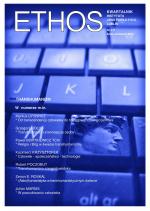 zobacz powiększenie | DOI 10.12887/28-2015-3-111-16 Eryk MACIEJOWSKI – A Libertarian Way Towards the Posthuman Being: Max More’s Extropianism Cena brutto: 7,00 PLN za szt. |
|
The article analyzes the basic assumptions of Max More’s extropianism, a current of transhumanist thought which emerged at the turn of the 1990’s. Extropianism was the first attempt at creating a complete transhumanist philosophy, and it turned out the only variant of transhumanism having such far-reaching political implications. While a majority of transhumanist thinkers abstain from any political declarations, More believes accepting the anarcho-capitalist version of libertarianism is a natural and necessary implication of his views. Extropy is a metaphorical antonym of entropy, denoting the extent of the existing order and complexity. According to More, increasing extropy is the goal of all the living organisms, including the human beings. In the first version of his extropist manifesto, entitled The Extropian Principles 2.5, More enumerates five principles of sustained extropy increase, namely: boundless expansion, self-transformation, dynamic optimism, intelligent technology, and spontaneous order. According to the principle of spontaneous order, an increase in entropy is fostered in decentralized systems which come into being as a result of the application of the accepted basic rules of action and which do not involve authoritarian centralized control over individuals. Therefore it is libertarianism in its anarcho-capitalist version that More believes to be the only social and political order that will promote extropianism. In his opinion, only the libertarian system ensures the freedom of experiment, the freedom of technological development and the freedom of research, simultaneously advocating a society with little or no government power. More agrees with the libertarians that government power results in limiting those areas of life which, once left undisturbed, become self-regulated and self-developed. Contrary to More’s contentions, while combining libertarianism with transhumanism remains a possibility, the two intellectual currents are actually independent. Libertariansim may though provide a social framework in which the transhumanist ideas might be implemented once demands to do so should appear. Otherwise, transhumanism necessarily involves libertarianism only in one instance, namely, on the grounds of the processual vision of the reality, once the rules operating in the natural world (i.e. self-organization, evolution, and expansion) are transferred onto the society composed of rational and expansive individuals who tend to preserve their existence, in particular foster its biological dimension. Such a vision of the reality, however, is not a constitutive element of transhumanism, and is characteristic of early extropianism only. In the later versions of his Principles of Extropy More abandons his radical ideas and supports loosely defined liberal ‘open societies.’ By doing away with the principle of spontaneous order, he eliminates the problematic metaphysical implications of extropianism and transforms it into an exclusively moral project. Translated by Dorota Chabrajska Keywords: anarcho-capitalism, extropy, extropianism, libertarianism, libertarian transhumanism, transhumanism Contact: Zakład Historii Myśli Społecznej, Instytut Filozofii, Wydział Filozofii i Socjologii, E-mail: erykmaciejowski@gmail.com Pliki do pobrania: » 111_Maciejowski.pdf | |
